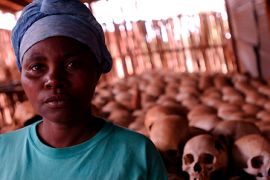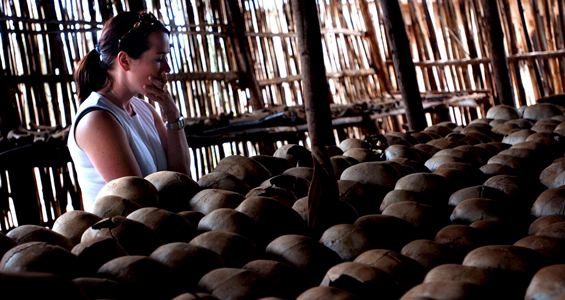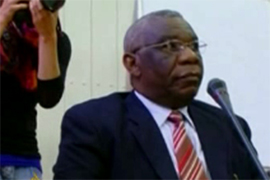Revisiting Rwanda’s dark days
A pastor goes on trial for planning and carrying out the massacre of 5,000 people.

 |
| Some 800,000 people died in the Rwandan genocide in 1994 [EPA] |
Finland is about to hold the first genocide trial in its history. Francois Bazaramba, a former Rwandan pastor who sought asylum in Finland in 2003, is accused of killing 5,000 people in the central African nation.
His lawyers tried to get the case thrown out after alleging that Rwandan police used torture to obtained testimony from witnesses, but Bazaramba faces life imprisonment if convicted.
Al Jazeera’s Alan Fisher reports on the events in 1994 which led to the massacre of 800,000 people in Rwanda, and the international community’s efforts since then to bring the guilty to trial.
I was driving somewhere in the UK in 1994 when the radio station gave me the news that the Rwandan and the Burundi presidents had been killed in a plane crash.
I remember thinking “that’ll soon disappear off the news agenda” and I heard no more about it, written off as a little local difficulty.
No one realised it would be the moment which triggered one of the darkest chapters of the 20th century.
A few months later I stood on a road just outside the border town of Goma in what was then Zaire.
| In video |
|
|
For as far as the eye could see, people filled both sides of the roads, their possessions piled high on their heads or backs bent double carrying what they could.
This was a population on the move, thousands desperately trying to escape the mass slaughter that was under way in Rwanda.
Refuge camps sprung up in unlikely places. Aid agencies tried to do what they could, but they were swamped.
In the morning, aid workers would tour the camps, collecting the bodies of those who had died during the night.
They would pile them on to stretchers and dump them in mass graves that were hurriedly being dug in the hard volcanic soil.
There was no dignity in death – compassion had to be kept for the living.
Eight hundred thousand Tutsis and moderate Hutus were killed in a matter of weeks. The world stood by, shook its head and did nothing.
Pastor’s trial
In an ordinary street in an ordinary town Francois Bazaramba lived an ordinary life.
But prosecutors say he was no ordinary man. Early on Tuesday, he will go on trial accused of genocide.
The Rwandan authorities say this pastor, a school headmaster, planned and carried out the massacre of 5,000 people, many of them women and children.
He faces the charge of genocide, trying to wipe out Tutsis, and faces a further 15 counts of murder.
He denies the charges.
 |
| Francois Bazaramba faces life in prison if convicted of genocide |
Since his arrest in April 2007, his legal team has interviewed witnesses, gathered evidence, prepared its case and insisted that it will prove his innocence.
Ville Hoikkala, a member of the team, told me: “We have spoken to people who lived in the area at the time. We have spoken to former prisoners who have told us witnesses for the prosecution were tortured to give their story. We will prove he did not do this.”
Augustin Ruzima lives a short drive from Helsinki.
In his small apartment, there are many reminders of the place he calls home. But he fears he will never be able to return to Rwanda.
He successfully applied for asylum here.
He knows the pastor – has met him several times.
He finds it hard to believe what the prosecutors allege.
“I don’t recognise the man they describe,” he says.
But he believes that for the future of his homeland, the case must be heard.
“If he did this, which I doubt, if he did this and the justice proves it, I think the next step is to say sorry, to apologise to the people. Then he must face the consequences. The people who died cannot be resurrected but the people who are still alive must know who was responsible for what happened.”
The case is being held here because Finland signed an international agreement to investigate and try genocide cases if the suspect lives in Finland.
There will be no jury. A panel of four judges will hear the evidence, and will move the entire proceedings to Rwanda for at least two weeks to hear from witnesses there.
A verdict is expected before the end of the year.
If found guilty, pastor Francois Bazaramba faces life in jail.